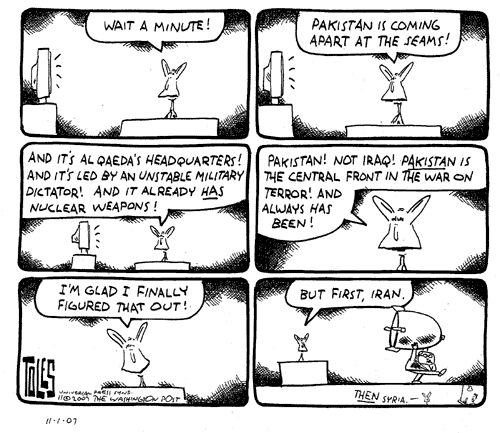Tuesday, November 06, 2007
NYT: 2007 Is Deadliest Year for U.S. Troops in Iraq

2007 Is Deadliest Year for U.S. Troops in Iraq
BAGHDAD, Nov. 6 — Six American soldiers were killed in three separate attacks Monday, the military said Tuesday, taking the number of deaths this year to 852 and making 2007 the deadliest year of the war for United States troops.
Military officials announced the discovery of a mass grave holding 22 bodies in a rural area north of Falluja. It also said that nine Iranians being held in Iraq would soon be released, including two detained during a January raid of a consulate office in Erbil.
Five of the American soldiers died in two roadside bomb attacks on Monday near Kirkuk, said Rear Adm. Gregory Smith, director of the communications division of the Multinational Force-Iraq, the formal name for the United States-led forces.
A sixth soldier died Monday during combat operations in Anbar Province, according to a military statement.
The deaths come only a few days after the military announced a steep drop in the rate of American deaths this year. In October, 38 American service members died in Iraq, the third-lowest monthly tally since 2003, according to Iraq Casualty Count, a Web site that tracks military deaths. November's total, if the current pace continues, would be higher but still far below the war's average of 69 American military deaths per month.
Despite the decline, American commanders acknowledged that 2007 would be far deadlier than the second-worst year, 2004, when 849 Americans died, many of them in major battles for control of insurgent strongholds like Falluja.
Military officials attribute the rise this year to an expanded troop presence during the so-called surge, which brought more than 165,000 troops to Iraq, and sent units out of large bases and into more dangerous communities.
Commanders maintain that despite the high cost in terms of lives lost, the strategy has brought improved security to the country and "tactical momentum" that could stabilize Iraq permanently.
The potential release of the Iranians may reflect American approval of some signs that Iran is cooperating with their demand that it stanch the flow of materials into Iraq used to make deadly roadside bombs known as explosively formed projectiles, or E.F.P.'s.
Admiral Smith said that the E.F.P. components found recently during raids "do not appear to have arrived here in Iraq after those pledges were made," suggesting that Iran has limited trafficking the weapon parts across the border after promising to do so.
American commanders have stopped short of declaring that Iran has in fact complied with the United States' demands, and Admiral Smith on Tuesday described the plan to release nine Iranian prisoners not as a diplomatic reward but rather as the perfunctory end to a criminal investigation.
"These individuals have no continuing value, nor do they pose a further threat to Iraqi security," he said.
Admiral Smith did not say why the two Iranians captured in January at an Iranian consulate office in Erbil were held for nine months, after Iran insisted that they were harmless government workers.
But Iraqi officials welcomed the announcement. Mohammed Al Haj Hamud, Iraq's deputy foreign minister, said the release would "improve the relations between the three countries" of Iraq, Iran and the United States before another round of planned meetings on security. "We want good relations with Iran and for Iran to avoid conducting any actions inside Iraq," he said. "A the same time, the Iraqi government is keen to maintain its relationship with its first and strongest ally, the United States of America.
Meanwhile, violence against Iraqis continued. The mass grave was found Saturday during a joint American-Iraqi operation in the Lake Tharthar area, a desolate rural area near the site of another grave, holding 25 bodies, that was found less than a month ago.
Local police officials said the bodies were dumped in and around an abandoned building.
"Some were buried in wells and some were left in rooms used as prisons," said a police officer who helped clear the grave. "These corpses are part of what we expect to find more of in the future."
Just south of Kirkuk, the police said that clashes with Iraqi and American forces on Tuesday left four gunmen dead. In a separate incident, gunmen attacked and killed the mayor of small village about 30 miles south of Kirkuk, and wounded his son, as they drove to a neighboring town.
A member of the governing council in Mosul was also assassinated in a neighborhood on the city's outskirts, the authorities said, and six policemen died when they were ambushed while driving to work.
And in Baghdad, the police found four dead bodies, two east of the Tigris River, two to the west. A roadside bomb exploded near an American patrol near Zawra park in western Baghdad, and a second bomb exploded in the central Baghdad neighborhood of Karrada, an interior ministry official said. He said it was unclear if there were any casualties.
South of the capital, in Latafiya, a bomb targeting a joint Iraqi-American foot patrol killed one Iraqi soldier. North of Hilla, the authorities found the body of a man in his 20s floating in a small river. He had been stabbed to death.